In this section: Imraan Buccus, Heather Ford, Anele Wondo, Emile Jansen, Kopano Matlwa and more…
Imraan Buccus, researcher
 Imraan Buccus is the man to talk to when it comes to poverty, civil society and public participation. His work in empowering civil society is driven by, he says, ‘the spirit embodied in ordinary people, despite the difficulties they face.” And lots of people care what he thinks. Most recently, he was on the team of SABC’s election analysts.
Imraan Buccus is the man to talk to when it comes to poverty, civil society and public participation. His work in empowering civil society is driven by, he says, ‘the spirit embodied in ordinary people, despite the difficulties they face.” And lots of people care what he thinks. Most recently, he was on the team of SABC’s election analysts.
Buccus is also a journalist with a weekly column in The Mercury and writes for the Sunday Tribune and the Mail & Guardian. He is the editor of the progressive Muslim publication, Al Qalam, which promotes plural coexistence in South Africa, and he is managing editor of the public participation journal Critical Dialogue. But his proudest achievement was drafting the strategy document on public participation for provincial legislatures. — Ilham Rawoot
Lunch spot: Yum-Thai, Durban North
Heather Ford, Open Source activist
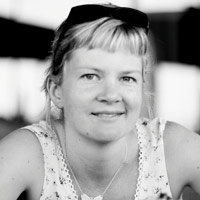 Heather Ford is seen as something of an Open Source guru in South African technology circles.
Heather Ford is seen as something of an Open Source guru in South African technology circles.
But understated in her jeans and T-shirt, blonde hair brushed back off her face, it’s easy to forget that this is a woman who counts Jimmy Wales of Wikipedia among her high-tech friends.
A few years ago, Ford was awarded the Benetech scholarship to work as a fellow in the Reuters Digital Vision Fellowship Programme at Stanford University. It was there, in California, that she started volunteering for Creative Commons, which she describes as a ‘non-profit organisation devoted to expanding the range of creative works available for others to build upon legally and to share.”
In 2004, Ford returned to South Africa to start Creative Commons South Africa and has worked in areas of internet policy, law and management. She also co-founded the African Commons Project and serves on the advisory board of the Wikipedia foundation.
Ford has the qualities of a good teacher too, expressing herself simply without being patronising or offhand when she explains the ins and outs of her work. She has delivered seminars on blogging for iCommons and on issues related to heritage through iHeritage.
Technology and development, she says, are the focus of her work. ‘The beauty of the internet is seeing development projects. There is an opportunity to lower the barriers without needing a lot of funding.”
Ford plans to begin a master’s in information science systems at the University of California, Berkley in August. But before she does that she ‘s hosting a meeting of the 50 top internet entrepeneurs right here in South Africa. — Eamon Allan
Lunch spot: Assagi, Illovo, Rosebank, Johannesburg
Anele Wondo, Branch coordinator: Social Justice Coalition
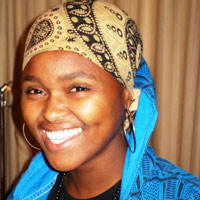 At just 21 years old, Anele Wondo is the epitome of a young activist. Her initially small voice becomes very powerful when she describes her work. She has already done time with Love Life, the Treatment Action Campaign and Equal Education, where she was involved in youth and community development, career guidance and providing support for people involved in gangs as well as pregnant teenagers.
At just 21 years old, Anele Wondo is the epitome of a young activist. Her initially small voice becomes very powerful when she describes her work. She has already done time with Love Life, the Treatment Action Campaign and Equal Education, where she was involved in youth and community development, career guidance and providing support for people involved in gangs as well as pregnant teenagers.
Through her job at the Social Justice Coalition, she has worked closely with Andrew Feinstein, Zackie Achmat and Mamphela Ramphele. Her passion comes from the history classes she took at school.
‘I learned how democracy is supposed to work, and people don’t seem to understand the word,” she says. Next year, Wondo will take her mobilisation skills to UCT, where she intends to study politics and media. — Ilahm Rawoot
Lunch spot: Royale Eatery, Cape Town
Emile Jansen, Hip-hop teacher and activist
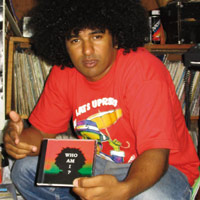 Emile Jansen is considered by many as a godfather of South African hip-hop, having co-founded one of the country’s first hip-hop groups — Black Noise — in 1988. Jansen is an MC, B-boy and graffiti artist.
Emile Jansen is considered by many as a godfather of South African hip-hop, having co-founded one of the country’s first hip-hop groups — Black Noise — in 1988. Jansen is an MC, B-boy and graffiti artist.
He grew up, and still lives on the Cape Flats, where he is passionate about encouraging people to seek knowledge. ‘It’s an African tradition that those who know, pass information to those who don’t,” he says, and he tries to do his part in this cycle by rhyming about issues and solutions.
He has created landmark projects such as the African Hip-Hop Indaba and youth development organisation Heal the Hood. Emile authored the 2004 book, My Hip Hop is African and Proud. He is currently touring the country with Black Noise, running hip-hop workshops with schoolchildren, including discussions on identity, a topic very close to his heart. — Ilham Rawoot
Lunch spot: Freshstop, Tokai, Cape Town
Kopano Matlwa, Student health activist
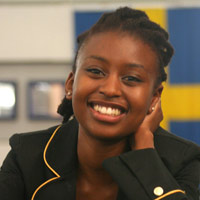 Kopano Matlwa’s beautifully nuanced portrayal of two very different young women growing up in the new South Africa in her novel, Coconut, won her the 2007 European Union Literary Award at the tender age of 21.
Kopano Matlwa’s beautifully nuanced portrayal of two very different young women growing up in the new South Africa in her novel, Coconut, won her the 2007 European Union Literary Award at the tender age of 21.
But Matlwa’s gifts do not end with all things literary. Since primary school she has wanted to become a doctor and is in her final year of medicine at the University of Cape Town. During her varsity stint Matlwa established Waiting Room Education by Medical Students (WREMs), an organisation that educates patients on health issues in student-run mobile clinics. She now sits on the WREMs board in preparation for a new executive after she leaves university.
In 2005 she represented South Africa as part of the Goldman Sachs Global Leaders programme. — Lynley Donnelly
Lunch spot: Anywhere I haven’t been
Abigail Knox, Leader, Green Police, University of Cape Town
 Abigail Knox might only be 23, but she’s been through more than most young people her age. But the biggest challenge she faced was her mother’s confinement to a wheelchair after her father’s death in 1995. Instead of focusing her energy on self-pity, Knox decided to help others wherever she can.
Abigail Knox might only be 23, but she’s been through more than most young people her age. But the biggest challenge she faced was her mother’s confinement to a wheelchair after her father’s death in 1995. Instead of focusing her energy on self-pity, Knox decided to help others wherever she can.
In December 2008, she used an inheritance she received to assist five Zimbabwean families with food, building materials and machinery to help them build new lives for themselves. In between her undergraduate and post-graduate degree, Knox spent seven months volunteering at Makaphutu Children’s Village in the Valley of a Thousand Hills in KwaZulu-Natal.
She is the leader of the Green Police, a green campus initiative at the University of Cape Town, where she assists in creating awareness on climate change, recycling and sustainability. — Jane Steinacker
Lunch spot: Starlings, Rondebosch, Cape Town
Nobahle Mangcu-Lockwood, Advocate: Cape Bar
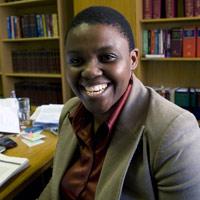 Nobahle Mangcu-Lockwood is spellbound by the cut-throat nature and challenges offered by the legal profession. Mangcu-Lockwood is an advocate at the Cape Bar and was in the centre of one of the most controversial challenges the legal system has faced in recent years.
Nobahle Mangcu-Lockwood is spellbound by the cut-throat nature and challenges offered by the legal profession. Mangcu-Lockwood is an advocate at the Cape Bar and was in the centre of one of the most controversial challenges the legal system has faced in recent years.
In May last year, she was a member of the counsel representing political parties — the African Christian Democratic Party, DA, Independent Democrats and the United Democratic Movement — in a bid to prevent the Scorpions from being disbanded.
Prior to that, Mangcu-Lockwood was an attorney at Cheadle, Thompson & Haysom, where she specialised in labour law and general public policy work.
She’s an LLB graduate from the University of Cape Town. — Jane Steinacker
Lunch spot: Radisson SAS Hotel, Cape Town
Bongani Ndlovu, Manager of media interventions: Soul City Institute
 Bongani Ndlovu lives his passion for community development. As the manager of media interventions for the Soul City Institute — the innovative multimedia health promotion and social change project — Ndlovu is responsible for the production of the Soul City television and radio drama series.
Bongani Ndlovu lives his passion for community development. As the manager of media interventions for the Soul City Institute — the innovative multimedia health promotion and social change project — Ndlovu is responsible for the production of the Soul City television and radio drama series.
Through drama and entertainment the programme, and it’s message, reaches more than 16-million South Africans.
Ndlovu is a regular guest on television talk shows, talking about the challenges faced by the youth. He’s also an associate member and deputy chairperson of the Soweto Youth Organisation and has started a book club in the area to encourage a culture of reading among young people in his community. — Jane Steinacker
Lunch spot: Moyo’s, Zoo Lake, Johannesburg
Donna McCallum, Fairy Godmother
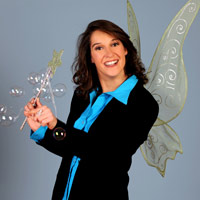 Donna McCallum sold up her shares as the managing director of iKineo, the marketing activation company she founded, to take a year-long sabbatical in South America. Five months into the trip, she found herself on a night bus in Argentina. And that’s when she decided on her destiny: to become South Africa’s first Fairy Godmother.
Donna McCallum sold up her shares as the managing director of iKineo, the marketing activation company she founded, to take a year-long sabbatical in South America. Five months into the trip, she found herself on a night bus in Argentina. And that’s when she decided on her destiny: to become South Africa’s first Fairy Godmother.
McCallum, who was one of the founders of Studentwise Media Services, which started magazines such as SL and Ymag and was on the founding team of a Silicon Valley dot com in the late Ninties, started up Fairy Godmother Inc., which helps individuals and organisations get ‘clear, inspired and focused on their vision, dreams and goals”and it assists them to make that dream a reality.
Since she started up her company a few years ago, McCallum has delivered her 12-week programme to over 1 300 individuals and has done talks in South Africa, England, the United States and Germany. — Eamon Allan
Lunch spot: Gypsy Lounge, Illovo, Johannesburg
Simangele Mabena, Gauteng regional representative,Community of Mandela Rhodes Scholars
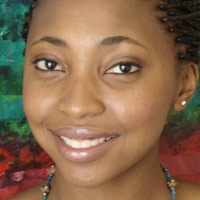 It was her work in Vancouver, Canada in 2006 as a special needs youth worker that Simangele Mabena began using the arts as a way to teach disabled youth. On her return to South Africa the following year, she began volunteering with the deaf youth in Soweto using drama processes to help learners better understand English literature.
It was her work in Vancouver, Canada in 2006 as a special needs youth worker that Simangele Mabena began using the arts as a way to teach disabled youth. On her return to South Africa the following year, she began volunteering with the deaf youth in Soweto using drama processes to help learners better understand English literature.
Mabena, who completed her honours in dramatic arts at the University of the Witwatersrand University in 2005, received the Mandela Rhodes Scholarship last year and has gone on to study towards her master’s in dramatic arts.
She serves as the Gauteng regional representative of the Community of Mandela Rhodes Scholars, an organisation made up of present and past recipients of the prestigious scholarship. — Jane Steinacker
Lunch spot: Mugg & Bean, Killarney, Johannesburg